In May, ASD, along with our partners at the Institute for Strategic Dialogue (ISD) and the University of Amsterdam (UvA), published a report documenting roughly 400 domains that had published identical or nearly identical copies of articles originally published on RT.com, Russia’s most influential, English-language propaganda outlet. Those domains, which likely represent a small fraction of the sites reposting Russian propaganda online, allow the Kremlin to continue to penetrate spaces and places that RT itself—due to a range of restrictions, bans, and sanctions—cannot.
With the US election less than a week away, it is essential that US audiences understand the true source of the information they are receiving, particularly if that source is controlled by a government that has a recent and documented history of interfering in US elections. To that end, we created a dedicated dashboard in early September on our Information Laundromat tool that systematically documents the domains where recently published articles from both RT’s English-language outlet and its Spanish-language cousin, RT en Español, have been reposted or cited. Many of the domains that have surfaced over the past two months are known entities that we, or others, have previously identified. Others are new, or at least underreported in the public domain. This post highlights both, as well as newly identified techniques used to evade domain-level restrictions on platforms that have banned RT.
RT’s Frequent Fliers
The charts below show the domains with the most matches between September 1 and October 30, 2024. Matches were determined by running newly published RT and RT en Español articles through the content similarity feature on our laundromat tool, which attempts to find duplicate or near-duplicate content across a range of databases and search engines, including Yahoo!, Microsoft’s Bing, DuckDuckGo, and Google. To limit spurious matches, we only included domains with an average match score equal to or greater than 80%, meaning that there is a high likelihood, especially in aggregate, that these domains are reposting content directly from RT. (For more information on how the Information Laundromat tool works, please visit the site’s About section.)
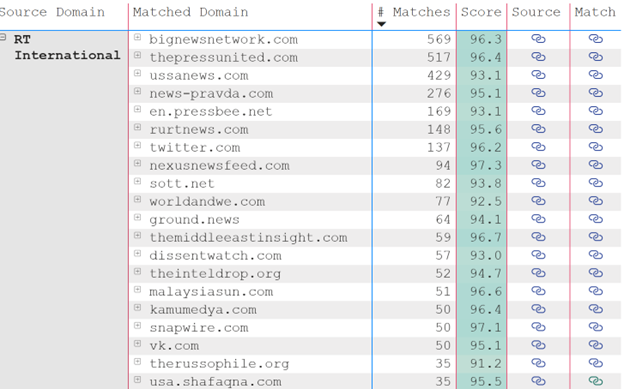
Figure 1: The most observed domains that posted RT International content in whole or in part between September 1 and October 30, 2024
Of the top 20 domains, only three—ussanews[.]com, rurtnews[.]com, and kamumedya[.]com—were not previously identified in our Russian Propaganda Nesting Doll report with ISD and UvA. Because our initial report did not focus on Russia’s Spanish-language content, the domains that surfaced in our RT en Español queries had, for the most part, not previously been identified. There was, however, some overlap with previously identified English-language sources. Sott[.]net, which stands for Sign of the Times, surfaced in both our English and Spanish language results, as did the Shafaqna network—a prominent global aggregator. Subdomains associated with Shafaqna[.]com ranked as the second (Venezuela.shafaqna[.]com), tenth (southafrica.shafaqna[.]com), and thirteenth (spain.shafaqna[.]com) most observed domains when we queried RT’s Spanish-language outputs. (For more information on the Shafaqna network, see page 34 of our Russian Propaganda Nesting Doll report.)
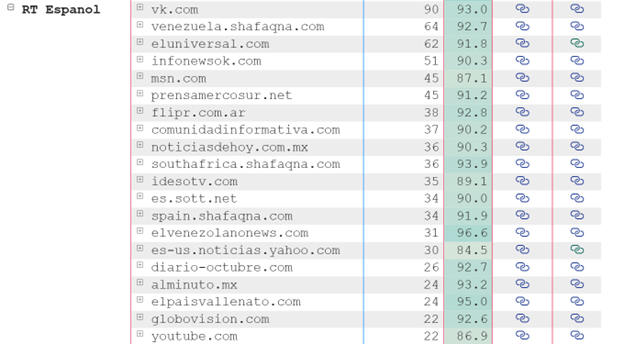
Figure 2: The most observed domains that posted RT en Español content in whole or in part between September 1 and October 30, 2024
The Endurance of the Big News Network
The most observed domain over the past two months was the bignewsnetwork[.]com, a website affiliated with a content distribution network of the same name. Besides its titular site, the Big News Network operates more than 500 websites that present themselves as local, regional, or national news outlets. While it reposts content from a variety of news sources—sometimes with attribution and sometimes without—it has routinely surfaced in our past research reports as a primary dissemination point for both Russian and the People’s Republic of China’s state media content. In one of those reports, we noted that the network was “the single largest source for RT-produced content” in search results available in the United Kingdom.
Since early September, we have found nearly 600 unique occurrences of RT articles that appeared on the Big News Network’s namesake site, along with dozens of other observations on at least four other Big News Network properties—Malaysiasun[.]com, Chicagochronicle[.]com, Nigeriasun[.]com, and Irishsun[.]com. RT articles reposted to the Big News Network were identified on every search service we track, led by Microsoft’s Bing (472 observations), DuckDuckGo (393 observations), and Google Search (69 observations). Though most of the observations of RT content on Big News Network properties in our study cited RT as the source, the reposting of Russian content on websites that appear to be local, US outlets, is of clear concern—especially during election cycles.
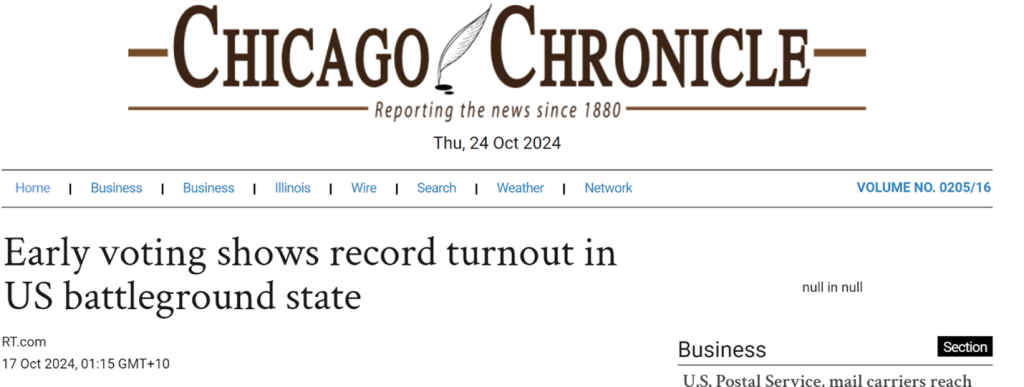
Figure 3: A screenshot of the Chicago Chronicle, a Big News Network property that reports content from RT.com
Rurtnews: RT’s Newest House of Mirrors
In our May report, we identified several domains that were directly mirroring RT’s visual appearance and content. One of those alternative domains, swentr[.]site, was registered by TV-Novosti, RT’s parent company, three days after RT was banned in the EU in response to Russia’s full-scale invasion of Ukraine. Because this site was visually identical to RT, its purpose, most likely, was not to deceive information consumers, but rather to bypass the filtering put in place by search services and social media platforms that were required by EU law to block RT’s domain.
Although swentr[.]site continues to surface in search results, a newer RT alternative domain, rurtnews[.]com, was far more prominent in our results, ranking as the sixth most observed domain over the past two months. Like swentr[.]site, rurtnews[.]com is an identical copy of RT’s website, but it has, to date, received limited attention—our research turned up only a handful of mentions of the site and its role in spreading Kremlin propaganda, most notably a report in early September from Insight News Media.
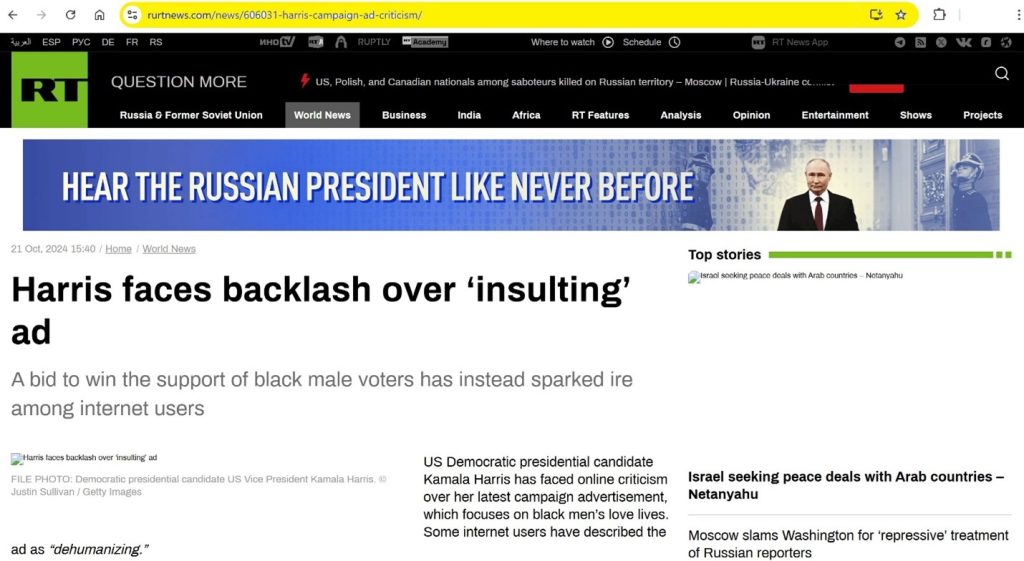
Figure 4: A screenshot of rurtnews[.]com, a website that mirrors RT[.]com's content and style
According to ICANN’s domain registration lookup tool, rurtnews[.]com was registered in April 2024, perhaps explaining both its absence in our previous report and the relative lack of available information about the site online. Though many websites that repost RT content may do so without the consent or even knowledge of RT, that does not appear to be the case with rurtnews, which shares several technical indicators, including a Google analytics ID and host name, with both RT[.]com and swentr[.]site.
It therefore seems likely that rurtnews[.]com is yet another attempt by TV-Novosti to skirt restrictions put in place by platforms, some of which have seemingly caught on to, and subsequently blocked, RT’s other alternative domains. At least on Facebook, it appears to be working—we found several examples of rurtnews[.]com articles being shared on the platform, despite Facebook’s announced ban of Russian state media.

Figure 5: A screenshot of metadata analysis of rurtnews[.]com's site conducted on the Information Laundromat tool

Figure 6: A Facebook post from October 28, 2024 linking to a rurtnews[.]com article. The account is not shown for privacy reasons.
La Lavandería: RT’s presence in Spanish-language outlets
RT’s ability to launder content into Spanish-language ecosystems is deserving of, and will in the future receive, more substantial analysis. But it is notable that several of the most observed domains over the past two months were linked—either directly or at least in name—to Venezuela. Perhaps most notably, the third-most observed Spanish-language outlet was eluniversal[.]com, a paper editorially aligned with the government of Nicolás Maduro. El Universal is one of the most circulated daily papers in Venezuela, and it has a sizeable social media presence with more than five million followers on X, close to one million followers on Facebook, and more than 700,000 on Instagram—a substantially larger audience than any of the websites identified in our English-language study.
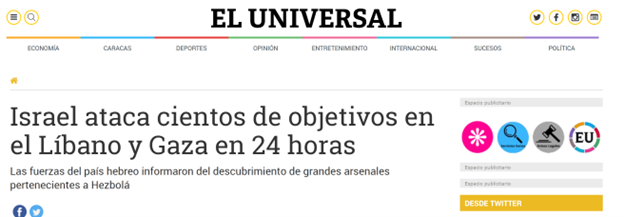
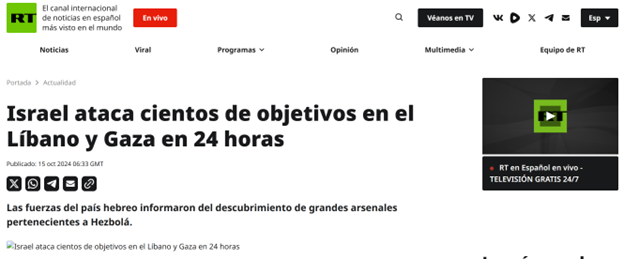
Figure 7: An article published by El Universal and the original article published by RT en Español
Also among the 20 most-observed domains was diario-octubre[.]com, a website that, according to the state media monitor, is a state-controlled outlet connected to the Russian government. (Note: we do not recommend clicking on the Diario Octubre website due to indicators that it is potentially unsafe.) While we could not independently verify the connections between Diario Octubre and the Russian government, the site’s outbound domains—meaning websites they link out to—show several Russian state media and Russian intelligence-linked outlets, as well as two sites connected to the Syrian and Venezuelan governments.

Figure 8: A Wayback machine screengrab of Diario Octubre and the outbound domains connected to Diario Octubre, sourced from the Information Laundromat, showing a number of websites connected to the Russian government or Russian intelligence
Social Media’s Leaky Blockade
As was the case in our initial report, social media channels continue to serve as primary vehicles for the dissemination of Russian propaganda—even in cases where those platforms have attempted to ban RT. In our English-language results, only platforms that have not blocked or restricted RT—X and Russian social media platform VK—appeared among the top 20 English-language domains. But this is largely due to our relatively high match score threshold for inclusion. If we had applied a more liberal match score, meaning that matched posts were, in aggregate, slightly less similar to queried RT articles, our results would have included Facebook, despite the fact that in September Meta joined Reddit and YouTube in banning links, pages, and accounts associated with RT.
Our research showed that, by and large, Meta has been successful at blocking links to domains with clear connections to Russian state media outlets. But as we previously documented with the case of rurtnews[.]com, unaffiliated domains and individual accounts that republished RT and RT en Español content have continued to evade detection. At times, the connection to RT was intentionally or otherwise obfuscated by the posting account or page; other times, RT’s branding was clearly visible in posts.

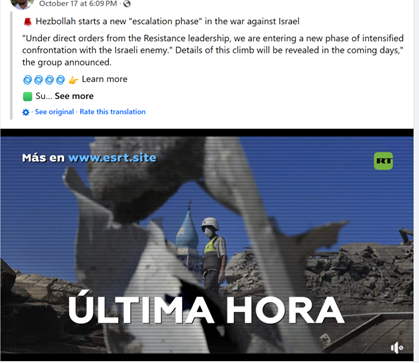
Figure 9: A post on Facebook from Venezuelan media outlet El Universal that is a copy-paste reproduction of an RT en Español article, and a similar post, made by an individual account (not included for privacy reasons) with the RT branding still visible
Whether an intentional strategy deployed by Russian state media or otherwise, the use of individual accounts to post RT articles, verbatim, in groups, was also evident, as were pages largely dedicated to posting RT’s written and video content.
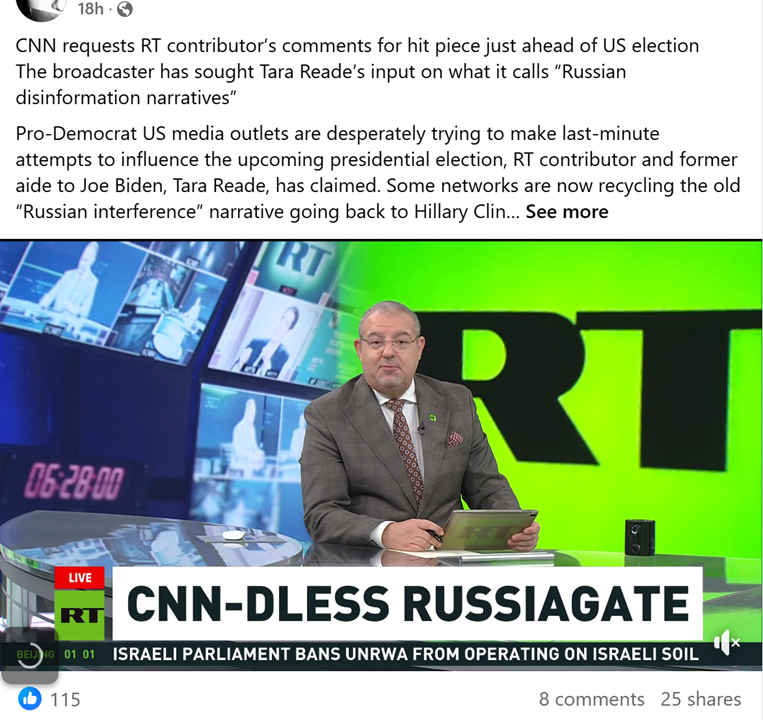
Figure 10: A Facebook page with nearly 62,000 followers that regularly posts embedded RT videos
Conclusion
Over the past several months, numerous indictments, intelligence community reports, and investigative reports have documented the central role of RT employees in attempting to covertly influence audiences in the United States. While many of the sites identified in this post may not be operating under the direct control of the Russian government or Russian state media, others, like rurtnews[.]com, almost certainly are. And regardless of the motives and intent behind those operating websites and social media accounts laundering RT’s content, they are collectively contributing to a less transparent information ecosystem at a time of heightened tensions when Americans need to know, and trust, the sources of information they are receiving.
The views expressed in GMF publications and commentary are the views of the author alone.





